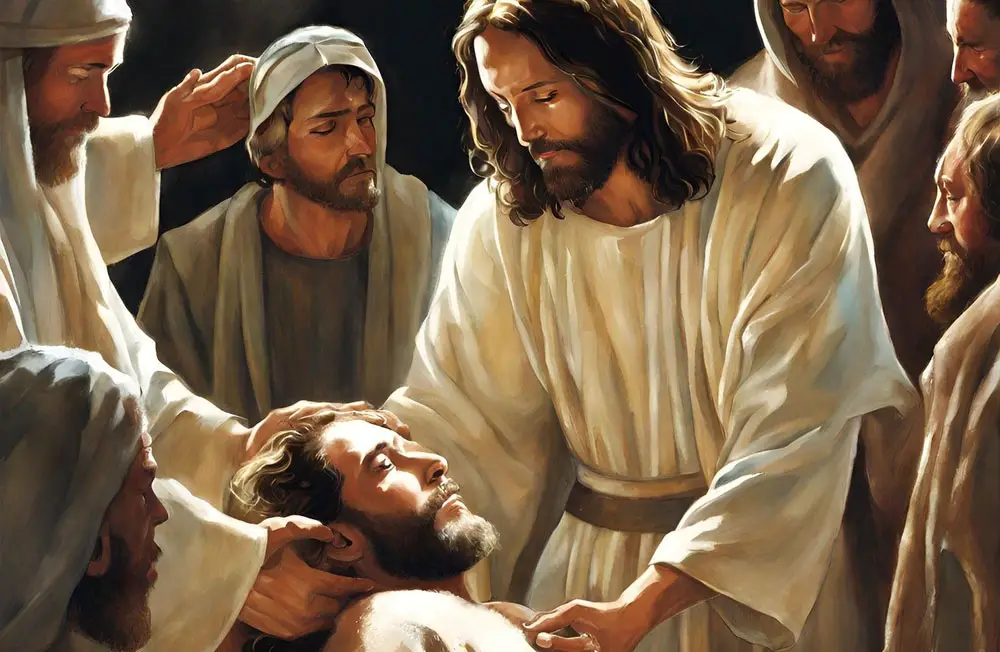John sat in the dimly lit church, his head hung low. He had been battling a debilitating illness for years, and despite countless prayers and visits to doctors, his condition only seemed to worsen.
John felt like he had exhausted all options, and a sense of hopelessness began to creep in.
As the pastor took the stage, he spoke of a topic that immediately caught John’s attention – the mercy of God.
The pastor’s words struck a chord deep within John’s soul, reminding him that God’s mercy is not something to be earned or deserved but rather a gift of grace freely given to those who seek it.
John listened intently as the pastor explained how the mercy of God is our source of healing and restoration, not because of our own merit, but because of God’s infinite love and compassion.
It was a message of hope that reignited John’s faith and renewed his determination to seek God’s healing touch.
The Mercy of God Defined

The word “mercy” is a profound and powerful concept in the Bible. It signifies God’s compassion, kindness, and willingness to withhold the punishment we deserve for our sins.
Mercy is a gift that we can never earn or merit; it is an expression of God’s unconditional love and grace.
According to Ephesians 2:4-5 (ESV):
“4 But God, being rich in mercy, because of the great love with which he loved us, 5 even when we were dead in our trespasses, made us alive together with Christ—by grace you have been saved.”
biblegateway.com
This verse reminds us that God’s mercy is not based on our own righteousness but on His immense love for us.
Healing is a manifestation of God’s mercy, a gift that we do not deserve but one that He freely offers to those who come to Him in faith.
The Bible says in Luke 5:12-13 (NIV):
“12 While Jesus was in one of the towns, a man came along who was covered with leprosy. When he saw Jesus, he fell with his face to the ground and begged him, ‘Lord, if you are willing, you can make me clean.’ 13 Jesus reached out his hand and touched the man. ‘I am willing,’ he said. ‘Be clean!’ And immediately the leprosy left him.”
biblegateway.com
The Biblical Examples

Throughout the Scriptures, we find numerous examples of individuals who experienced healing and restoration through the mercy of God.
- The Leper: In Luke 5:12-13, a man with leprosy approached Jesus, acknowledging his unworthiness but also his faith in Jesus’ ability to heal him. He said, “Lord, if You will, You can make me clean.” Jesus, moved by mercy, responded, “I will; be clean!” and the man was immediately healed.
- The Two Blind Men: In Matthew 9:27, two blind men followed Jesus, crying out, “Son of David, have mercy on us!” They did not demand healing as a right but humbly sought Jesus’ mercy, and their faith was rewarded with the restoration of their sight.
- Epaphroditus: In Philippians 2:25-27, Paul’s companion, Epaphroditus, was sick to the point of death. However, Paul testifies that “God had mercy on him, and not only on him but on me also, lest I should have sorrow upon sorrow.” God’s mercy intervened, and Epaphroditus was healed.
The Accessibility of God’s Mercy

One of the most remarkable aspects of God’s mercy is that it is available to all, regardless of our past or current circumstances.
The Bible says in Romans 9:15 (NIV):
“For he says to Moses, ‘I will have mercy on whom I have mercy, and I will have compassion on whom I have compassion.’”
biblegateway.com
God’s mercy extends to everyone, even those whom society may deem unworthy or undeserving.
In Luke 7:36-50, we read the story of a sinful woman who washed Jesus’ feet with her tears and anointed them with expensive perfume.
While the Pharisees judged her harshly, Jesus commended her faith and declared, “Your sins are forgiven.”
The mercy of God covers our mistakes, disobedience, and lack of understanding.
It is a gift that transcends our human limitations and shortcomings, providing us with the opportunity to experience healing, restoration, and a fresh start in life.
Responding in Faith

While healing is a gift of God’s mercy, it is not something that we can demand or earn.
Instead, we receive it by faith, acknowledging our unworthiness but also our trust in God’s infinite love and compassion.
In Matthew 9:29 (ESV), Jesus said to the two blind men:
“According to your faith be it done to you.”
biblegateway.com
Their faith in God’s mercy opened the door to their healing.
To receive God’s mercy for healing and restoration, we must approach Him with humility, acknowledging our need and our inability to earn His favor.
We must also have faith, believing that He is willing and able to heal us, not because of our own merits, but because of His great mercy.
Conclusion
The mercy of God is a profound and life-changing truth that should fill our hearts with hope and gratitude.
It is the source of our healing and restoration, not because of anything we have done, but because of God’s unconditional love and grace.
As we navigate the challenges of life, let us cling to the promise of God’s mercy. Let us approach His throne of grace with confidence, knowing that He is eager to extend His mercy to those who seek Him in faith.
Share your testimonies of God’s merciful healing and restoration, and encourage others to embrace this amazing truth.
For it is through the mercy of God that we find hope, healing, and a future filled with His blessings.
Key Takeaways
- The mercy of God is a gift that we can never earn or deserve; it is an expression of God’s unconditional love and grace.
- Healing is a manifestation of God’s mercy, not something we merit through our own righteousness or good works.
- The Bible provides numerous examples of individuals who experienced healing and restoration through God’s mercy, including the leper, the two blind men, and Epaphroditus.
- God’s mercy is available to all, regardless of our past or current circumstances, extending even to those whom society may deem unworthy or undeserving.
- To receive God’s mercy for healing and restoration, we must approach Him with humility, acknowledging our need and our inability to earn His favor and have faith in His willingness and ability to heal us.
Frequently Asked Questions
Q. What is the biblical definition of mercy?
A. Mercy is a compassionate and undeserved forgiveness and kindness shown to someone who has offended or sinned. It is a fundamental attribute of God, who extends mercy to all who call upon Him.
In the Bible, mercy is often contrasted with justice or judgment, as it represents God’s willingness to withhold the punishment we deserve.
Q. How does God’s mercy relate to healing and restoration?
A. God’s mercy is the source of our healing and restoration. Healing is a gift of God’s grace that we do not deserve or earn through our own righteousness.
When we approach God in humility and faith, seeking His mercy, He is willing to extend His healing power to us, not because of our merits, but because of His great love and compassion.
Q. Why is it important to understand that healing is a mercy from God?
A. Understanding that healing is a mercy from God helps us approach Him with the right attitude – one of humility and gratitude, rather than entitlement or self-righteousness.
It reminds us that we are not owed healing, but that it is a gift from a loving and merciful God who desires to restore us to wholeness.
Q. How can we receive God’s mercy for healing and restoration?
A. To receive God’s mercy for healing and restoration, we must approach Him with humility, acknowledging our need and our inability to earn His favor.
We must also have faith, believing that He is willing and able to heal us, not because of our own merits, but because of His great mercy.
Additionally, we can pray and ask for God’s mercy, confessing our unworthiness but also our trust in His love and compassion.
Q. Does God’s mercy mean that everyone will be healed?
A. No, God’s mercy does not mean that everyone will be healed in this life. While God’s desire is for us to be whole and healed, there are times when His purposes may be different from our expectations.
However, even when physical healing does not occur, God’s mercy is still at work, providing us with the strength, peace, and hope we need to endure our trials and ultimately find our complete restoration in His presence.






